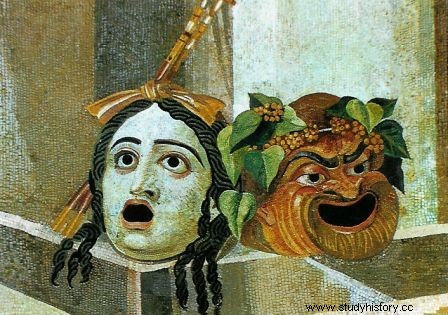We invite you to travel back in time and witness a performance in the Sicilian theater:

We arrived at the crowded entrance to the theater, a sober semicircular construction of porous gray granite lining a gentle hill facing the sea. The complex left me stunned, being able to verify that the Syracusans did value the theater for what it was, something great, magical and fabulous. I will not deny that I was somewhat perplexed because I had seen few or none of those architectural wonders in my youth, much less full of people so varied and richly dressed.
We reached the entrance to the main vomitory where we continued to see dozens of ladies wearing their high and complicated hairstyles, very elaborate with ringlets, bows and clips, risky false artifices, sometimes of different shades, with which they tried to unseat each other to see which one was more innovative. jewels sparkling in the bright day, slaves dressed as Oretan oligarchs, and wealthy tycoons from all over the island, all wearing robes, stoles, chlamydes, and togas of so many colors, stylish and not, vying for a good spot on the streets. first cavea localities.
Several slaves were busy helping the plebs, less fortunate when it came to choosing a seat, to be placed correctly in the high stands while vendors of trifles, pitchers of grenadine soda and cold starters did business with the hungriest spectators.
Pharos, as our fellow Siculus was called, had a surprise in store for us. When presenting his credentials, visibly marked with the seal of the Curia, to one of the operators who distributed the capacity through the secondary vomitories, the official in question quickly mobilized a couple of subordinates who accompanied us to the center of the stalls. We pass in front of the imposing frontal scene, richly decorated with statues of scholars, poets, writers and all kinds of geniuses and divinities between columns of polished pinkish marble. We had reserved five enviable and inaccessible seats in the area of the authorities, in the center of the orchestra in front of the pulpit […]
[…] It was an unforgettable experience. From that moment I knew that the civilized world differed from barbarism by its ability to produce civil art and architecture, not by its ability to produce weapons and devastation. I remember very well that first and only function that I have witnessed in my life. I was impressed by the deathly silence of the more than three thousand spectators, attentively following the languid movements of the actors and their declamations in Socrates' own language, which curiously, their bizarre masks of grotesque gestures did not distort thanks to the clear propagation of sound in that huge venue.
That monument had an acoustic typical of the abode of the gods. The actors playing the characters of the opposite sex, somewhat effeminate and overly characterized as actresses, fluttered about the stage, from left to right of the pulpit like nymphs harassed by the obsessed Pan, but despite their masculinity as graceful as if they were They would slide along a soft surface, covering their beautiful, lean and muscular bodies with dark gauze and transparencies that aroused the elemental instincts of men and women while the rest of the actors twisted on themselves in emotional passages of the play.
Large pieces of fabric painted to enhance the setting, and even moving parts of the set, were modified during the performance to the amazement of those present. When the tragedy concluded, a resounding applause rewarded the efforts of those artists who so well interpreted the mixed feelings of their characters. What a pity that such a beautiful profession is so socially devalued...
- Did you like it, Naso? – the Roman magistrate asked me when the full capacity rose to applaud the artists –
- Much more than my limited vocabulary can express. It's been a fabulous experience, Domine. Each city should build an enclosure like this to be able to enjoy moments as intense as the ones we have enjoyed. An arduous task, my father's generation does not understand these refinements – I replied –
- Well, you know, when your father retires from public life and you fully belong to the Curia of the Council of your city, you already have your first plea. A brand new stone theater for Valentia – Pharos intervened with some hilarity –
- I doubt it would succeed, dear friend. Our arsetan neighbors will anticipate us in building it before. There they are much more given to the Hellenic and less to the native […] – I slowly explained to Unibelos, Pharos, Artemio and the governor, since they were all following the conversation –
- Arsetans…Arse? Is it a region or a city?
- The Latin name, Saguntum, will sound more familiar to you.
- Of course! By Jupiter, Saguntum is an ancient and important city, Hispanic, and, as you say, steadfastly loyal to the Republic and an essential part of the commercial network west of the Tyrrhenian that brings so many benefits to the state. It is lawful for his council to invest a large part of its substantial taxes and fees resulting from this intense trade in civil engineering that improves the quality of life of its inhabitants. Aqueducts, sewers, roads, temples, forums, bridges and theaters are the practical toys with which Rome rewards its most obedient and seasoned children.
- And the wayward, Domine? – the subtle Artemio asked the governor rhetorically –
- The perfidious Corinth, the greedy Carthage or your indomitable Numantia paid dearly the high price of their lack of vision. And when the trumpets of Rome sound, the dialogue ceases. There is only one present and one future, and it is called Rome […]
VALENTIA, The Memories of Cayo Antonio Naso
